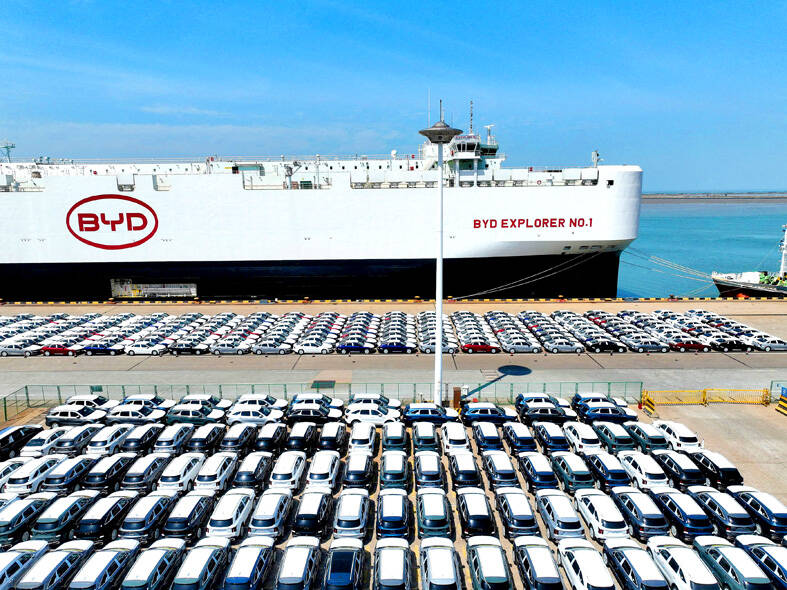Chinese brands last month captured 11 percent of the European electric vehicle (EV) market, notching record registrations as manufacturers raced to beat stiff EU tariffs that took effect early this month.
SAIC Motor Corp (上海汽車) led the charge, shipping its MG4 hatchback to dealers in volume, according to analysts at researcher Dataforce, which compiled the figures.
Vehicles registered before July 5 could be sold to customers without the added duties on imported EVs.

Photo: Reuters
Chinese brands registered more than 23,000 battery EVs across the region during the month, the most ever, Dataforce figures showed.
Their 72 percent sequential jump from May was twice the gain in overall European EV registrations for last month.
Chinese-made imports from Western manufacturers, including Volvo Car AB, BMW AG and Tesla Inc, are also subject to the new duties.
Whether the volume gains can be sustained will be closely watched in the coming months, as the added EU tariffs take hold. The EU’s provisional charges subject SAIC to an additional 38 percent charge, while BYD Co (比亞迪) is to pay an extra 17 percent on the existing 10 percent customs duty.
Automakers on both continents are rushing to add European EV manufacturing so they can avoid the new duties, while tensions between Beijing and Brussels risk devolving into a trade war.
While state-owned SAIC was responsible for the biggest jump in Chinese-branded imports, about 40 percent of the MG4s registered last month were self-registrations by dealers — “not a very healthy growth,” Dataforce product head Gabriel Juhas said.
The company is offering generous leasing deals, including a two-for-one MG4 promotion in Germany, where EV sales have sputtered.
Conversely, there were signs of progress for BYD, the world’s largest EV maker.
A marketing push centered on the Euro Cup Championships in Germany gained traction with consumers, Dataforce analyst Julian Litzinger said.
Another driver of the European EV market last month was the introduction of incentives in Italy, which helped to spur a doubling of battery EV sales in the country from a year earlier.
About 200 million euros (US$216.65 million) in new EV subsidies ran out in less than nine hours, the Italian government said in a statement.
About 60 percent was tapped by families and the rest by companies.
The rise vaulted Italy, which has been lagging in EV sales, into the top six of a regional market that includes EU states, countries like Norway and Switzerland that participate in its single market, and the UK.

When an apartment comes up for rent in Germany’s big cities, hundreds of prospective tenants often queue down the street to view it, but the acute shortage of affordable housing is getting scant attention ahead of today’s snap general election. “Housing is one of the main problems for people, but nobody talks about it, nobody takes it seriously,” said Andreas Ibel, president of Build Europe, an association representing housing developers. Migration and the sluggish economy top the list of voters’ concerns, but analysts say housing policy fails to break through as returns on investment take time to register, making the

‘SILVER LINING’: Although the news caused TSMC to fall on the local market, an analyst said that as tariffs are not set to go into effect until April, there is still time for negotiations US President Donald Trump on Tuesday said that he would likely impose tariffs on semiconductor, automobile and pharmaceutical imports of about 25 percent, with an announcement coming as soon as April 2 in a move that would represent a dramatic widening of the US leader’s trade war. “I probably will tell you that on April 2, but it’ll be in the neighborhood of 25 percent,” Trump told reporters at his Mar-a-Lago club when asked about his plan for auto tariffs. Asked about similar levies on pharmaceutical drugs and semiconductors, the president said that “it’ll be 25 percent and higher, and it’ll

CHIP BOOM: Revenue for the semiconductor industry is set to reach US$1 trillion by 2032, opening up opportunities for the chip pacakging and testing company, it said ASE Technology Holding Co (日月光投控), the world’s largest provider of outsourced semiconductor assembly and test (OSAT) services, yesterday launched a new advanced manufacturing facility in Penang, Malaysia, aiming to meet growing demand for emerging technologies such as generative artificial intelligence (AI) applications. The US$300 million facility is a critical step in expanding ASE’s global footprint, offering an alternative for customers from the US, Europe, Japan, South Korea and China to assemble and test chips outside of Taiwan amid efforts to diversify supply chains. The plant, the company’s fifth in Malaysia, is part of a strategic expansion plan that would more than triple

Taiwanese artificial intelligence (AI) server makers are expected to make major investments in Texas in May after US President Donald Trump’s first 100 days in office and amid his rising tariff threats, Taiwan Electrical and Electronic Manufacturers’ Association (TEEMA, 台灣電子電機公會) chairman Richard Lee (李詩欽) said yesterday. The association led a delegation of seven AI server manufacturers to Washington, as well as the US states of California, Texas and New Mexico, to discuss land and tax issues, as Taiwanese firms speed up their production plans in the US with many of them seeing Texas as their top option for investment, Lee said. The